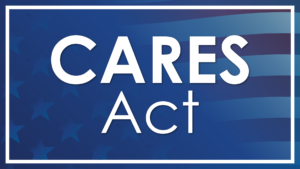Congress Passed a Stimulus Package – Now What?

We understand that this is a difficult time for everyone, and it can be overwhelming trying to understand the impact of COVID and the actions being taken as a response. Congress recently had a unanimous vote to pass a historic $2 trillion stimulus package called the Coronavirus Aid, Relief and Economic Security Act (CARES Act).
Direct Payments: $250 billion is set aside for direct payments to some individuals and families. Under the plan, individuals earning $75,000 in adjusted gross income or less could get direct payments of $1,200 each. Married couples earning up to $150,000 could receive $2,400 – and an additional $500 per child. The payment would be scaled down by income, phasing out entirely at $99,000 for singles and $198,000 for couples without children. The program is designed for those filing 2019 taxes with direct deposit to see the funds through “rebate” payment. Those who have not yet filed will have their eligibility based on 2018 tax returns.
Small Business Loans: For businesses, or companies with 500 or fewer employees, $350 billion of the budget is set aside for loans. This would be to help encourage firms to maintain payroll and help with costs such as mortgage interest, rent, and utilities.
Unemployment Benefits: The legislation includes numerous provisions to enhance the unemployment benefits available while the United States deals with the effects of COVID-19. One of the provisions would apply to nearly all individuals to receive a temporary emergency increase in their weekly benefit of $600 in addition to state unemployment of up to 100% of lost wages. This would be fully funded by the federal government until July 31, 2020.
Distressed Companies: A large portion of the money (approximately $500 billion) will be set aside for struggling companies and even cities and states. $50 billion of those funds will be specifically directed towards the airline industry. Participating firms will be restricted from issuing stock buybacks or paying dividends for one year after loan repayments.
401k Withdrawals: The CARES Act also provides additional ways for Americans to access cash by allowing people to withdraw up to $100,000 from their retirement savings, including 401(k)s or IRAs, without the typical 10% withdrawal penalty. While this new exemption may help cover short-term expenses, individuals should consult with their human resources department as well as their financial advisor before withdrawing from retirement funds.
Required Minimum Distributions: The CARES Act impacts taxpayers who are required to take from their retirement accounts in 2020. It applies to beneficiaries of inherited retirement accounts, as well as those who attained age 70 1/2 as of December 31, 2019. The Act has suspended all required minimum distributions for 2020. Therefore, if you have not already taken and prefer not to, you may avoid doing so. There is no rule preventing you from taking your 2020 distribution. If you have already taken the distribution and it has been less than 60 days since you receive it, you may be able to deposit the entire amount back into the account by the 60th day. The 60th day is a very strict rule that you should consult with your tax and financial advisor about whether stopping or reducing your IRA distributions make sense for your financial picture.
Hospitals and Healthcare Workers: $100 billion will go towards grants to help fight the Coronavirus and make up for dollars lost by delaying elective surgeries and procedures to focus on the outbreak. As those on the front line fighting the virus, it will provide for critical investments into personal and protective equipment for workers, testing supplies, and increased workforce and training among a few. It would also allow them to receive a bump in Medicare payments for treating patients with the virus.
Self Employed Individuals and Employers: Employers and self-employed individuals would get to defer the 6.2% tax they pay on wages that are used to fund Social Security. Keep in mind that the deferred tax would have to be paid over the following two years: half by 12/31/2021 and the remaining half by 12/31/2022.
Please note that this information is sourced from various resources and is intended for informational purposes only. The information provided in this article can change and you should consult with your financial advisor to discuss further.
The opinions voiced in this material are for informational purposes only and are not intended to provide specific advice to any individual. Consult your legal, tax, and/or financial advisor to determine what is appropriate for your situation.
Questions and Consultations
If you have questions or if you’d like to schedule an appointment to discuss your finances, contact us today.
Check out more information about our investment strategy and make sure to sign up to receive our monthly e-newsletter here.
The opinions voiced in this material are for informational purposes only and are not intended to provide specific advice to any individual. Consult your legal, tax, and/or financial advisor to determine what is appropriate for your situation.
As a Registered Investment Advisor (RIA), Partnership Wealth Management is committed to providing our clients with financial planning and wealth management services to help them work towards their financial goals. At Partnership Wealth Management, we have a long history of working with the LGBT community. Among the many services we offer are financial planning and estate planning strategies for gay and lesbian couples. Financial planning is an important part of preparing for the future; contact us today to get started: www.partnershipwm.com. While we try to provide our clients with the best information out there, we are not responsible for any information contained on third-party websites.





